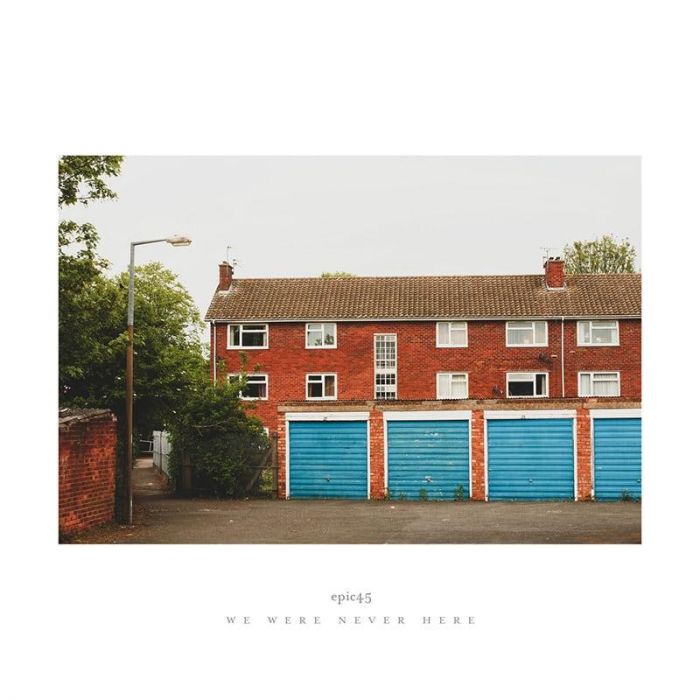We Were Never Here by Epic45 (Review)

It makes sense that We Were Never Here, the latest album from the duo of Ben Holton and Rob Glover — aka, the nostalgist pop group epic45 — is the musical accompaniment for a book of the duo’s photography. Thanks to releases like Weathering, In All the Empty Houses, and May Your Heart Be the Map, epic45’s discography has long been typified by nostalgia-soaked shoegazer-y music that’s perfectly suited for thumbing through aging, faded photos from decades long since gone.
We Were Never Here, though, dives even deeper into that aesthetic in that it contains some of the most abstract and “out there” music that epic45 has released to date. Which makes sense from a soundtracking perspective. But rather than come off as pretentious, the level of abstraction here — possible press quote: “Imagine The Durutti Column collaborating with the Ghost Box crew” — enhances the emotional effect. Released from normal verse/chorus song structures, these fourteen songs and their rich, ambient sounds are left free to wrap themselves more fully around the listener. Which they most certainly do.
With their dulcet tones, the dappled guitar notes that open the album on “Moss Laden” evoke a sense of sinking back into one’s self and memories. It’s the sound of introspection captured on tape, and the result is one of the loveliest songs in the whole epic45 repertoire. The following track, “Through Frosted Glass,” continues that mood with piano notes and drones blurred and smudged to the point that you’re convinced you’re hearing them from across a great gulf of years.
Nearer the album’s end, songs like the aptly titled “Transcendental Decay” and “Your Life Is a Faded Spire” indulge in sounds captured in a state of gentle deterioration. It’s hard not to imagine that the recording tape itself was decaying even as epic45 were laying down their ambient synths and ethereal guitars.
Most of the album’s songs are warm and diaphanous but even when a song dips into more ominous territory, it’s nothing less than captivating. “Among Ruins” (another album highlight) features a stark synth backdrop against which the band weaves a lattice of shimmering, Vini Reilly-esque guitars to stunning effect. Later, the scattered beats and building walls of noise on “Private Path” would be sedate on any other album, but here, they become almost oppressive.
We Were Never Here’s fourteen songs often seem like they’re composed of little more than wisps of sound (e.g., fluttering synths and decaying electronics, reverb-drenched guitars, a sigh of tape hiss, illusory field recordings). In the hands of less experienced musicians, that might lead to lightweight, flimsy songs that feel more like affectations than anything else. Holton and Glover have been at this for over two decades, though, and they know how to use even the barest of sonic elements — along with a healthy dose of production magic and a bevy of effects pedals, I’m sure — to tug at the heartstrings, to deftly tease and pull at one’s own sense of memory and time.
Indeed — and at the risk of repeating the same old clichés when describing the music of epic45 (and their fellow nostalgists) — don’t be surprised if We Were Never Here leaves you wanting to dig out that old box of photos and journals in your attic, or to settle down in your favorite chair with a cup of tea, stare out the window, and reminisce a bit about better, simpler, and more innocent times.
I suspect that we’re all doing a lot of that sort of thing during these pandemic-haunted days. And if you’re willing to let go of musical structures and just surrender to the mood, then We Were Never Here’s faceted ambience may very well prove to be a fittingly haunting soundtrack for any such activity.